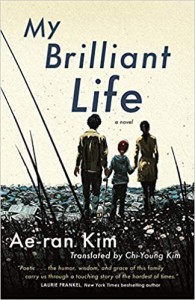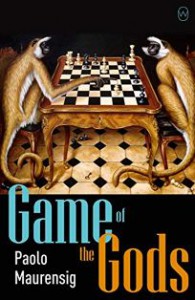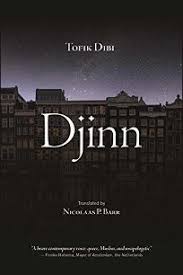Amidst the uncertainty of what the new year will bring, one surety is that wonderful literature remains to be discovered. In our first selections of new translations for 2021, there is a masterclass in historical fiction about a chess champion whose awe-inspiring trajectory was regrettably tainted with prevailing prejudice; a Dutch memoir that reconciles public and private definitions of sexuality, personhood, and recognition; and a Korean novel that beautifully illustrates that median pain between a love of life and an acknowledgement of its ephemerality. Read on to uncover their discrete and distinct gifts!

My Brilliant Life by Ae-ran Kim, translated from the Korean by Chi-young Kim, Forge Books, 2021
Review by Ah-reum Han, WoW Editor
Meet Areum Han, the sixteen-year-old boy with a rapid-aging genetic disorder that is at the palpitating heart of Kim Ae-ran’s bestselling novel, My Brilliant Life, translated by Chi-young Kim. “This is the story of the youngest parents with the oldest child,” writes young Areum, in the prologue to his own story. Readers learn some simple truths about Areum from the get-go: he has an uncanny way with words, he loves his parents deeply, and he doesn’t have much time left. But don’t be fooled; this story is not about the sick, nor is it about overcoming suffering. This quirky, bighearted book crackles with life on every page.
My Brilliant Life is a bildungsroman in fast-forward. We enter Areum’s life on the cusp of his final act—and, incidentally, at the age that his own young parents had him. What ensues is a tale that is tender and funny, startling and sad. He writes about his condition:
People say it’s a miracle that I’ve lived this long. I think so, too; not very many people in my situation have lived past their sixteenth birthdays. But I believe that the larger miracle exists in the ordinary, in the living of an ordinary life and dying at an ordinary age. To me the miracles are my parents, my aunts and uncles, our next-door neighbors, the middle of summer and the middle of winter. I’m no miracle.
We become familiar with this enviable “ordinary” through Areum’s watchful eyes, meeting his father, Daesu, who is equal parts foolhardy and brash but with a boyish charm, and Mira, his proud, sharp-tongued, and fiercely protective mother. We see how they each grieve privately and publicly; how they fight, curse, and joke; how they keep secrets to be kind. We watch their simple moments of ordinary miracles: eating shaved ice together, or laying on the living room floor with face masks on.
With Areum’s growing medical expenses, Daesu and Mira struggle to make ends meet, and reluctantly agree to let Areum go on a television show. Through this national exposure, Areum has new encounters with the ordinary. For one, he meets Seoha, a seeming kindred spirit and young girl who reaches out to him after seeing him on the show. Their email exchanges soon bloom into something more—the thrill of first love, tempered with the gravity of impending loss. As Areum’s circumstances quickly unravel, we ache for him to be a teenager with teenage-sized problems. We wish him the mistakes and failures, the freedom to pout and sulk.
In all this, Daesu and Mira do what they can to give Areum a normal life, and Areum knows it. This stereo vision—Areum’s awareness of his parents’ struggles and their lives both before and beyond his own—shows us how Daesu and Mira were also unceremoniously thrust into adulthood. My Brilliant Life is a coming of age tale, not just for Areum, but also for his parents, whose stories bookend his. This is a story that is very aware of its own symmetry: the two unlikely seventeen-year-olds who became parents; their child destined never to outlive them; and the stirrings of a newborn as their first slips away. The story folds into neat patterns that amplify life’s indifferent poetry.
Kim’s style is ambitious, playful, and cinematic. Beyond the actual scenes with the cameras, production crews, and the final airing of the episode, the storytelling devices reflect the same visuality. Scenes throughout the book cut from one moment to the next, crisp and vivid, jarring in their immediacy. Kim uses soundbites of dialogue here, a flash of color and memory there, a sudden closeup, and then an aerial view in a languishing backstory. Here, we really experience Kim’s humor and mastery of the short form. It is a careful choreography, a director’s cut produced, edited, and stitched together to dramatic effect—one that is ultimately greater than the sum of its parts. We become aware of the story’s seams and of absence—of all the elements that propel you from one moment to the next and of all the action and emotion that happen off-screen.
Each of the book’s four parts has its own cadence. We experience time, expanding and contracting in unexpected ways, but at the end of the day, there is one thing that we cannot unknow: Areum will die. Death is the engine driving the plot forward, as much as these narrative devices stall for time. It looms, never far from our minds, even in humorous moments like when Little Grandpa Jang fumbles through his television interview, or when we cut away from the present for a while to dream with Areum jumping on the trampoline. Death is a shadow whose features sharpen and solidify with each page. By the end, when he’s close enough to touch, we’re not sure whether he comes as an old friend, welcoming one home, or as an enemy to whom we must finally surrender.

Game of the Gods by Paolo Maurensig, translated from the Italian by Anne Milano Appel, World Editions, 2021
Review by Shawn Hoo, Editor-at-Large for Singapore
I saw that it was not the prospect of gain that convinced him, but rather the idea that his life might be told in a “book,” as if only books could relate the truth.
Within the Italian novelist Paolo Maurensig’s oeuvre of historical fiction, the act of writing books often drives the plot. Consider Theory of Shadows (2015), whose middle-aged, Venezuelan, twenty-first-century narrator is seized abruptly by an “obsession” to write a historical novel. The subject of his thrilling fixation is the Moscow-born World Chess Champion, Alexander Alekhine—a man with an alleged affiliation to the Nazis—whose mysterious death in a hotel room in Estoril, Portugal one morning in 1946 has the narrator suspecting murder, even after all these years. Finding himself in the very city of Alekhine’s death, he is gripped by a sense of fading historical and architectural evidence—even the fateful hotel has been demolished—and, as writers go, he tries to trace his subject’s footsteps, carrying his manuscript to reread on walks.
In Game of the Gods, Maurensig returns to the chessboard in order to reconstruct the lost steps of Alekhine’s contemporary—the Indian chess master Malik Mir Sultan Khan—whose three British Championship victories, overshadowed by the prevailing colonial racism, could not win him the title of Grandmaster or lasting fame in chess history. His life was cast into final ignominy when he was accused of having defrauded Cecilia Abbott, a wealthy American woman whose family fortune was amassed manufacturing weapons. We are told all this by a Washington Post journalist, a certain Norman La Motta, sent to Punjab on the eve of the Second Indo-Pakistan War in 1965. Having travelled on an impulse to Mittha Tawana—all the while “assuming a purely Eastern mentality,” that is (in a faintly Orientalist manner), adopting an open mindset—to meet Sultan Khan where he was born, our journalist-narrator finds himself writing the book of the loquacious Sultan Khan; recording, almost verbatim, the oral history of a man lost to time and destiny.
With brisk footwork and dazzling prose rendered into English by Anne Milano Appel, the novel brims with the voice of Sultan Khan’s urgency to relate—at the end of one’s life, on the brink of a war—his prolific if foreshortened rise to fame in the throes of a fading yet persistent imperialism. Sultan Khan’s mythical opening sets the tone for the contradictory presence of the British in his childhood: the village he lives in is besieged by a bloodthirsty tiger—animated by the long-tongued goddess Kali—and has enlisted the help of Punjab’s richest landowner, Maharaja Sir Malik Umar Hayat Khan. One detail, however, marred his celebrated arrival:
Among the many colorful costumes worn by the trackers, one khaki colonial outfit, worn by a white hunter with a cork helmet on his head and a Browning carbine on his shoulder, stood out in all its lackluster monochrome drabness: the Indian prince had invited his British friend to a tiger hunt, and this matter was criticized by a number of villagers, who did not look too kindly on Britain’s meddling in our country. But, as I would later discover, the relationship between the prince and the British colonizers was rather complicated, fueled by conflicting feelings.
As things turn out, the tiger was “a pawn of karma,” and Sultan Khan, inheriting this conflict, would become a pawn in the Maharaja’s game to prove that he is equals with his British peers. Under the patronage of the Maharaja, the precocious boy—a talented chaturanga player, both his parents lost to the tiger attack—gets trained in the rules of European chess, put in a woollen jacket and a pair of trousers, with a turban on his head and a large coat on his shoulder, was lifted out of his village to—as a subject of the Crown—compete in Europe.
In the vein of maladjustment to the metropolitan capital found in novels such as Tayeb Salih’s Season of Migration to the North or V. S. Naipaul’s The Mimic Men—but lacking initially in the kind of cosmopolitan hybridity afforded by class—Sultan Khan’s existence in London is uneasy. He thinks that English food tastes like “cadavers coated with dew,” and gets mocked as an “idiot savant.” He finds chaturanga—once sacred as a “philosophical text”—completely desecrated by his British chess opponents who “fidgeted in their chairs, stood up to stand behind [him], yawned, cough, puffed pestilential cigar smoke in [his] face, drank whiskey, ate ham sandwiches and belched.” All this while, rebellion and nationalist movements brew back home, Europe is on the brink of war; he finds himself caught between places and identities.
With this bold and compelling act of historical imagination, Maurensig imbues another great but marginalised figure of chess history with a capacious interiority and a history as intricate and elegant as the most calculated chess games; a minor history played against and with the grand History of imperialism, fascism, and migration. Beyond the veneer of Sultan Khan’s sparkling championship trophies, there lies a deep ambivalence about his own identity. Past that brief but illustrious career, where he is “no longer a chess player nor a servant,” he moves between the English countryside—finding himself at the heart of a world war—and across the Atlantic to New York, so alienated now from the village he grew up in. But, as Sultan Khan reminds us,
Conflicts never entirely end: they reappear under different, unsuspected guises. In the future, the theaters of war will no longer be those of land and sea, or sea and sky, but of the human mind.
Thus, that initial conflict—the Maharaja astride his British friend—reappears from place to place, from decade to decade. Here is a story of how someone can be severed from the role he is given, only to face himself in a different guise. Like a single chess piece destined to move in the same way, over and over again, on a predetermined chessboard—its rules ossified by centuries of standardization—by some hitherto unseen hand and yet by his very own calculation, Maurensig’s Sultan Khan embodies the tension of at once making history and being made by history, of writing and being written.

Djinn by Tofik Dibi, translated from the Dutch by Nicolaas P. Barr, SUNY Press, 2021
Review by Sabrina Parker Greene, Assistant Editor
In the introduction to this tender, honest memoir, former Dutch politician Tofik Dibi confesses that his purpose in writing it was “to no longer feel invisible.” The theme of (self-)reflection and visibility runs deep throughout this vulnerable story, which served, upon its original Dutch publication in 2015, as Dibi’s public (and perhaps even personal) coming out—following his life from childhood, through terrorism and Islamophobia, to politics and the truth. Not only does Dibi succeed in making himself wholly seen and heard, but he also provides a mirror image for those like him, making space for them to be their full selves as well. Reflection, both internal and external, in the mirror and in media, continues to stop in its tracks the othering we have normalized in modern society.
The book’s title, Djinn, refers to the spirit inside of Dibi that follows him everywhere, his hidden sexuality. It is referred to as “it” throughout the memoir, while “they” refers to his various communities: his Moroccan-Dutch family, his colleagues, his fellow Muslims, his friends. The continual use and italicization of the pronouns “it” and “they” seems to suggest that some fear still lives inside Dibi, that an unquestioning self-definition is still not quite accessible to him (not to mention the italicization is a bit distracting). Despite not quite being able to name his djinn, Dibi does denote it in a particular way, managing to be simultaneously specific and elusive. Does he owe any more than that?
A central question that plagues Dibi throughout the memoir is that of the private life versus the public life. Can a person truly be whole if the former differs from the latter? Dibi qualifies this binary of public versus private by specifying the grey area of the secret life. “Every person has three lives: a public life, a personal life, and a secret life,” he writes. “Am I only really free if I make my secret life public? Or is it a sign of freedom if I have the choice to keep it to myself?” Although everyone may have some sort of public life or another, it seems that becoming a member of parliament—an elected representative, a public official—further blurs these lines and increasingly magnifies the public life. By becoming a representative of the people, Dibi has to reconcile his definition of himself with the partial image he chooses to show his constituents. He fights for and protects the Muslim community, of which he is outwardly part, but chooses to defend the LGBTQ+ community only as an ally, not as a member. Does it matter that people don’t know he’s gay, as long as he protects gay people? Journalists and fellow Dutch citizens seem to think so, as Dibi is pestered with questions about his sexuality while an MP, and is encouraged (not lightly, it seems) to come out publicly—sometimes as a way of offering his constituents the opportunity to see themselves in him, sometimes for no other reason than the interviewer’s curiosity. Dibi never does choose to do so while in office. Who is he protecting, then? The short answer is himself, for reasonable fears about how his sexuality will be interpreted by his various communities.
During his time as an MP, Dibi becomes well-known for his stirring and persuasive speeches and debates. The irony, then, he writes, is that “however good I am with words, the thing I really want to speak about is stuck in my mouth.” Dibi can debate about issues relating to economics, immigration, freedom of religion, racism, and more as they relate to Dutch law and society, but he cannot speak to his sexuality—he can neither confirm nor deny it, in so many words.
In terms of language, Dibi speaks both Dutch and Arabic, but this book comes to us in English, gracefully translated by Nicolaas P. Barr, who also opens the book with an admirable introduction. This memoir serves as a coming out for Dibi as a gay man, but is also his debut as a writer. He, his whole self, and his writing are made accessible to a much larger world than he previously reached. Towards the end of the book, Dibi meditates on the idea of interpretation when he interviews gay imams for Vice (after his time as MP) and reads the Koran verses they suggest to him in a brand new way. Ultimately, the meaning of the text lives inside the reader, whose experiences and individuality color everything that is read, whether it be a religious text or another person’s memoir. Dibi’s book, then, turns into an homage to the written word and to translation itself; to what we say, how we say it, and to whom.
*****
Read more from the Asymptote blog:

